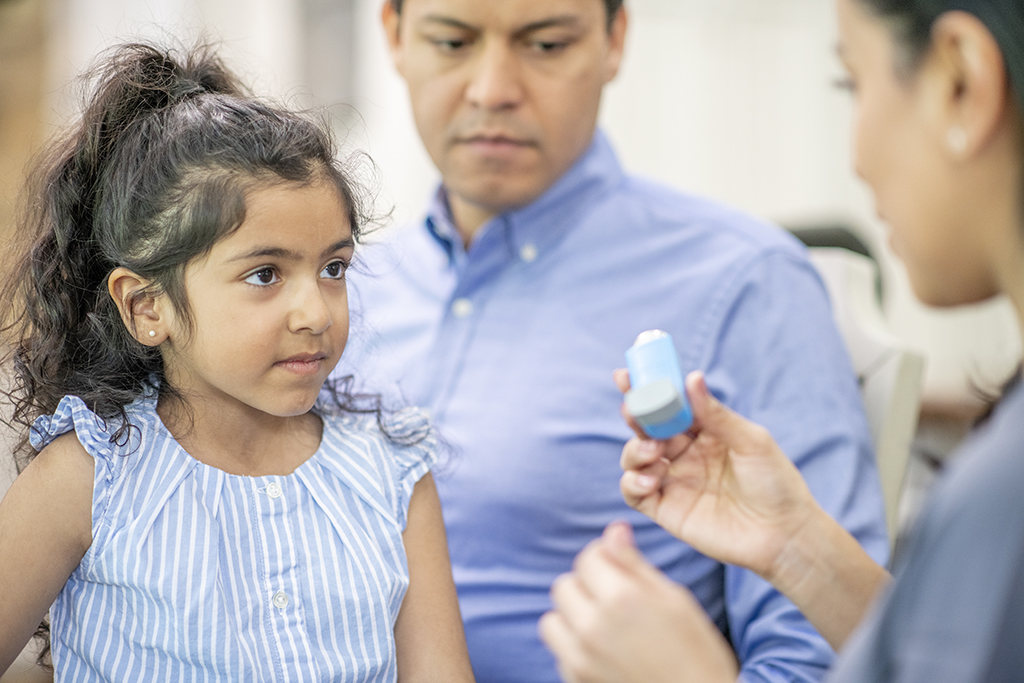
Wilmington Health Pediatrics is the only Physician Asthma Care Education (PACE) certified private practice in Wilmington.
Patients of participating PACE physicians had:
- Fewer days affected by asthma symptoms
- Fewer emergency room visits
- Fewer urgent office visits
The goal of this Clinic is to provide your family higher quality asthma care and improve the health of your child by providing asthma education and a medical home for each child. Your child’s medical home will provide medical care and will refer them to any specialty care provider as necessary.
Our Asthma Care Coordinator, Mary Turnbull, will be working closely with you, your child, and the provider to get your child’s asthma under control. Working together will ensure that the needs of your child are attended to.
The Clinic will follow children with a diagnosis of persistent asthma more frequently as recommended by the NIHLBI Guidelines for the Diagnosis and Management of Asthma, endorsed by the American Academy of Pediatrics.
Timeline for asthma care visits
- 2 – 6 week intervals while gaining control
- 1 – 6 months intervals to monitor control
- 3-month intervals to step down therapy after control is established
- Spirometry frequently throughout the year to measure lung function
What to expect
- A physical exam
- Spirometry may be performed if your child is 5 years and older
- A review of past asthma history and medications
- A review of environmental triggers and allergies
- One-one asthma medication and device training with you and your child
- Completion of forms for use of asthma medications for the current school year.
Communication at visits
Before each visit, consider what problems or questions you and your child have had with their asthma. Write those down and please bring them with you to the “asthma-only” appointment. In addition, we ask you to please download, complete, and bring the asthma assessment form with you to your appointment.
Please communicate with your child’s medical provider and tell them:
- What medications your child is currently taking and bring them with you to your child’s appointment
- How often your child is taking their controller medicine
- How often your child is using their quick/rescue medicine
- What symptoms your child is experiencing and how often
- How they are sleeping at night, any nighttime coughing
- How is asthma affecting daily routine and activities
We ask you to please listen closely to the instructions your doctor and asthma educator give you.
- Ask questions if you don’t understand.
- Review your child’s asthma action plan with the doctor/asthma educator.
- Write down information you talked about during the visit or ask for patient handouts.
Please bring ALL of your child’s asthma medications, inhalers, and spacers to the asthma appointment.
PACE certified physicians
- Noah Archer, MD, FAAP
- Susannah Aylesworth, MD, FAAP
- Daniel Ott, MD, FAAP
- Pamela Taylor, DO, FAAP
- Suzanne Smith, MD, MPT, FAAD
- Caryn Bowden, FNP-C
- Victoria D Tucker, FNP-C
- Erin Whitehead, NP-C
Asthma Facts & Forms
Find out if your child’s asthma is under control with Baylor’s Health Care System’s Consider the Rules of Two®
Learn more about asthma and asthma’s impact on the nation by downloading the Center for Disease Control and Prevention’s Asthma fact sheet.
If your child has asthma, download this form to find out what to do during Flu Season.
Be prepared and take control of your child’s asthma systems and download the Asthma Action Plan.
The Asthma Control Test helps your provider decide if your child’s current treatment plan is working. Please download and complete the appropriate form below.
Asthma Resources
Learn about the serious complications and effects asthma can have on those who are diagnosed with asthma by watching these videos.
- “Mikey’s mom didn’t know asthma could kill.”
- “Asthma attack led to football player’s death”
- “Ryleigh’s Story: A Daughter’s Fight for Life After Debilitating Asthma Attack”
- “How Asthma Makes Me Feel”
View these informative asthma websites to help you get a better understanding of asthma and how to control of your child’s asthma.
